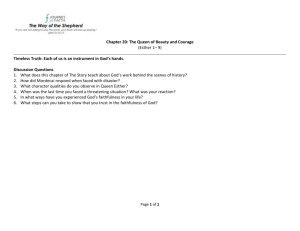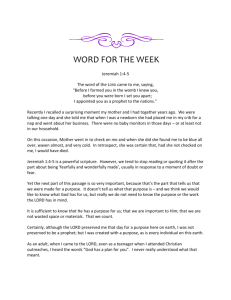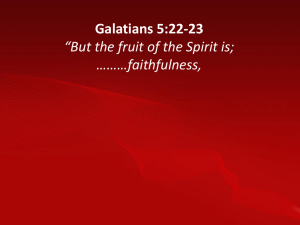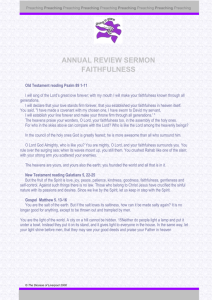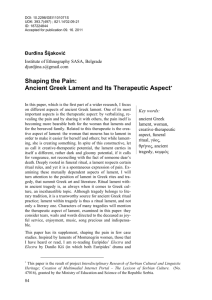"Good Shepherd … Good Sheep"
advertisement
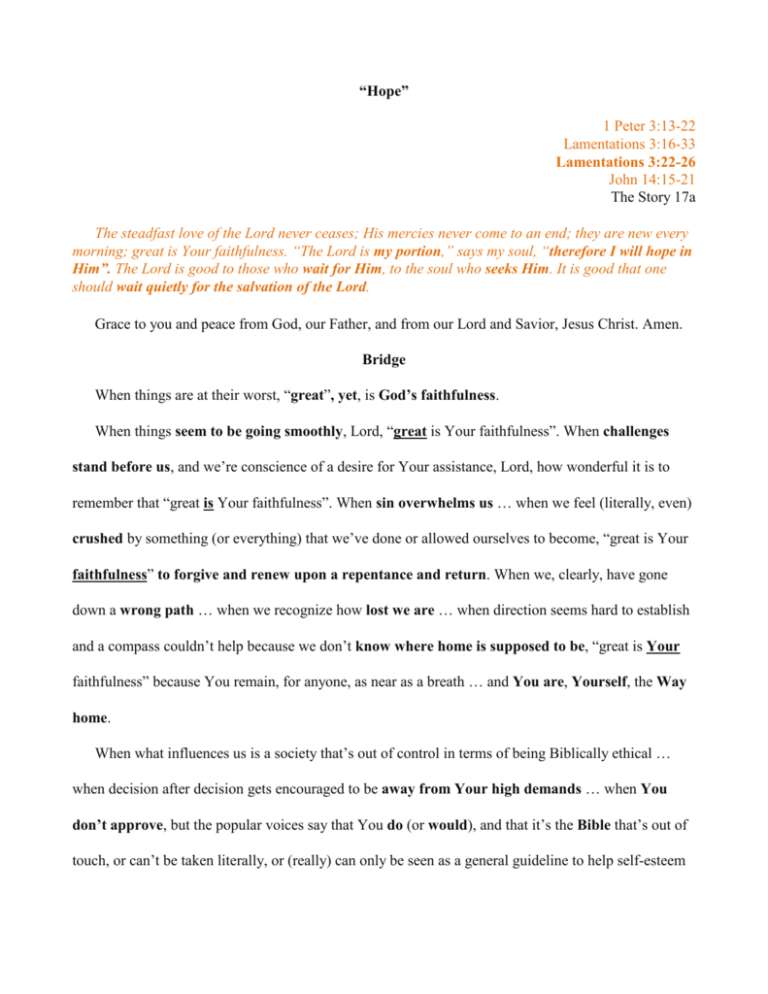
“Hope” 1 Peter 3:13-22 Lamentations 3:16-33 Lamentations 3:22-26 John 14:15-21 The Story 17a The steadfast love of the Lord never ceases; His mercies never come to an end; they are new every morning; great is Your faithfulness. “The Lord is my portion,” says my soul, “therefore I will hope in Him”. The Lord is good to those who wait for Him, to the soul who seeks Him. It is good that one should wait quietly for the salvation of the Lord. Grace to you and peace from God, our Father, and from our Lord and Savior, Jesus Christ. Amen. Bridge When things are at their worst, “great”, yet, is God’s faithfulness. When things seem to be going smoothly, Lord, “great is Your faithfulness”. When challenges stand before us, and we’re conscience of a desire for Your assistance, Lord, how wonderful it is to remember that “great is Your faithfulness”. When sin overwhelms us … when we feel (literally, even) crushed by something (or everything) that we’ve done or allowed ourselves to become, “great is Your faithfulness” to forgive and renew upon a repentance and return. When we, clearly, have gone down a wrong path … when we recognize how lost we are … when direction seems hard to establish and a compass couldn’t help because we don’t know where home is supposed to be, “great is Your faithfulness” because You remain, for anyone, as near as a breath … and You are, Yourself, the Way home. When what influences us is a society that’s out of control in terms of being Biblically ethical … when decision after decision gets encouraged to be away from Your high demands … when You don’t approve, but the popular voices say that You do (or would), and that it’s the Bible that’s out of touch, or can’t be taken literally, or (really) can only be seen as a general guideline to help self-esteem and approval (earthly happiness) occur, and we’re pressured to redefine You, as well … and we’re tempted to … “great is Your faithfulness” still (which has not changed … nor will it). When a country fails … or a state, or county, or city, or town, or family, or household, or friend … “great”, Lord, “is”, yet, (and will always be) Your “faithfulness”. We could, easily, be drawn to lament what we see in our mirrors … what we see on our TVs … what we hear on the news … what we know pressures our children in the schools. We could lament what we tolerate (maybe, even, much of what think we enjoy). We could lament our lot-in-life … our lousy luck, or the special persecutions that we think we get, or the lack of appreciation of us, or respect we think we deserve, or esteem, or recognition. We can lament getting passed-up for things … or for how hard it is to makes ends meet … or for never catching a break or getting ahead or saving. We can lament not getting what we want (maybe not, even, knowing what it is that we want), so we exist in a fog of despair, if not depression, blaming bad advice or therapies for steering us or medicating us too much to, actually, be productive. We can, even, lament God for, either, allowing or (we think) making our situations. Try using these words for our next pity party: “God has made my teeth grind on gravel, and made me cower in ashes; my soul is bereft of peace” (that means “absent”); and “I have forgotten what happiness is; so I say, ‘my endurance has perished’.” We forget, though, the fact that “great is [His] faithfulness”. It’s us who have disappointed us. It’s our nature and world that has imposed itself upon us to create the bad (and, even, horrible) issues that we have. God has no interest in making us suffer. He had no interest, really, in making Himself suffer because of suffering. He’d committed to do it for us, so He followed through … but He didn’t desire the suffering part any more than He wants that for us. Read Genesis 1 and 2. That’s what God wants! But Genesis 3 happened … and, since, there’s a lot for which we have to lament. There really is. Text It’s possible that we think ourselves immune to what happened to the then People of God where we’re at in The Story (the late 600s and early 500s). They were 100% in grace by the covenant of circumcision. They were supposed to be a whole blessed nation / country / people gathered not in the formation of free rights to exercise anything they wanted; but, instead, under a joint confession of the Lord, God, Almighty. How could we (in the plurality of allegiances in which we live) escape what their singularity of worship (at least on paper) could not. And, so, their history may be ours … or worse. For them, a series of governors led in an inconsistent roller-coaster ride of priorities which differed for each one. Since the fall of their northern brothers, King Manasseh (of the south) messed up big-time. His grandson Josiah turned things around for a bit, but after him, four others had short, but damaging, runs where they “gave away the farm” to a major enemy (the Babylonians rather than the Assyrians this time). Little by little (in smaller chunks that led to a bigger one), every city, up to, and including Jerusalem, got taken. Even God’s Temple, eventually, got gutted and, then, destroyed. Meanwhile (while this downfall for what was supposed to be God’s faithful and protected people was under way), the prophet Jeremiah lamented. Probably best known for his laments and tear-filled prophecies, Jeremiah mourned every aspect of what appeared to be inevitable. Direction could have been reversed for this nation, and the prophet gave it his best shot to incite such a thing, but the ship was sailing … and down-wind … and winds blowing toward disaster push powerfully from behind, so few “fought the current” even though everyone felt that the canoe they’d helped to aim was on its way toward Niagara’s Falls. At some point, daring the current to sweep us away changes to where it, just (flat-out), carries us away. Why wouldn’t people, just, change course? Judah had the opportunity, through repentance, to be redeemed and protected all the way up to the very end, yet they left Jeremiah almost alone to paddle against a direction that everyone else seemed to be more interested in going. Are we too close to danger? …. I think that we are. Are we so close to danger that we can’t return to safety? …. I know, for sure, that we are not. One thing we’d have to do, though, is stop blaming others for our problems … therapeutic (feel good) answers rather than confession / absolution ones. We will never try to change our course if we believe it’s too firmly held in the hands of others (so out of our, or God’s, control). We chart our courses … or we allow Him to. That’s what we do! We make most of our beds. We put ourselves into contexts which tempt us. We choose the unhealthy over the healthy. We measure our exposure to Good while allowing ourselves to be liberally exposed to things bad that challenge, if not consume us. We must confess ownership of those things which we have to lament of. We must repent of what we do and of what we’ve allowed fallen influences to make of us. Not only ought we to be sorry for all of these things (and, that means blame ourselves, rightly, for the fact that they exist), but we must want and will to be “turned around” (it’s what “repent” means) and have our eyes, brains, feet, and ears guided into contexts where wholesome exists … Godliness … blessings rather than, either, curses or nothing beneficial, at all. Now, some of those lamentable things are our fault as a society. Any personal struggles may be thrust upon us by a general distance creation’s fallen-to … a distance far from God’s intent for it. Even those things which victimize us (for the moment) need, still, our assumption of the blame for them because even we have the innate propensity to wander away from God rather than to Him … and that (overall) gives birth to our problems. Jeremiah spoke “lamentations” for all of that. In particular (there, where he was), the prophet knew what all of that … sin … would breed. And, yet, he spoke of “hope”. For those lamenting, “hope” is the Gospel contrasted against every lamentable issue. Out of tears … even full sobbing … something different is offered. Whether the issue is cancer or disappointment … or the effects (in full-force) of a mistake … “hope” still exists, and is offered … and the One who offers it is capable of delivering it. God, according to Jeremiah, has the fondest idea to make ours the wonderful blessing of what’s His to give. As it turns out, that’s “the steadfast love of the Lord [which] never ceases; His mercies [which] never come to an end … new every morning”. That nation, of our Story, would know the results of God’s faithfulness. In spite of their arrogance, then their fall and exile, they would still have the offer of redemption. Not within their lifetimes, but within what effects their lifetimes, reinstatement, renewal, and blessing would (in spite of their situations) be made available (and hinted-at) by preparations for a new Temple, the permission to go and build it again, and live around it, and, then (ultimately) to see God’s Presence born-in-their-midst-given to live faithfully for them, be baptized into them, and, then, die to rise making life-from-death something available to everybody. Hope in God was not in vain … even though, for these, they’d made it, initially, hard to recognize. However veiled, hope in God was a sure thing (a guarantee) that was worthy (in every sense) of being clung to, and reminded of, and lived under. Hope in God retained the holiness of a nation that God made to be holy … no matter how it ever looked … because it was the “great faithfulness of God” (not people) in which such a thing relied. And it still does today. The covenant God made with us, He made through the bloodshed of His Son … then linked to us at our baptism. He said, there, “I will be your God and you will be my child”. Your “Portion” (to use a word that Jeremiah did) God became. Now, you may forget that fact now and then. You may think, sometimes, that the water and name that got poured upon you once was an interesting gesture, but that “couldn’t have made such a significant change in your status as to make God’s promises yours”, but you’d be wrong, and God’s Word would remind you otherwise. Jesus spoke to those similarly made to be in covenant with His Father before His Ascension. Since Ascension’s remembered this next Thursday, it’d be good to hear, ourselves, about hope from His mouth. Jesus said (and does to any in His Church … it’s to whom He was speaking): “I will ask the Father, and He will give you another Helper, to be with you forever, even the Spirit of Truth Whom the world cannot receive, because it neither sees Him nor knows Him. You, though, know Him, for He dwells with you and will be in you. “I will not leave you as orphans”, Jesus said; “I will come to you. Yet a little while and the world will see me no more, but you will see me” and we’re reminded, with that, of the taste we get of Him in His Supper and the epiphanies He gives us through His Word. But His next Words are (without a doubt) the place where hope gets set upon something really great. To those who are His, Jesus promised:“Because I live, you also will live”. …. Application There are stories available of hope, in situations, where much of the world might see, only, hopelessness (granted, without knowing the Lord, how can one day be faced with anything more than a superficial wishfulness). But, of the many “now” stories that could be told to encourage an everpresent hope within us, one, from God, might be the best. Staying, just, within the ministry of the prophet Jeremiah, God said to a Remnant (that’s the Church, even if small): “I know the plans I have for you: plans for welfare and not for evil, to give you a future and a hope. You will call upon me and come and pray to me, and I will hear you. You will seek me and find me, when you seek me with all your heart. I will be found by you … and I will restore your fortunes and gather you from all the nations and all the places where you have been driven, and I will bring you back [to a place safely with Me].” May we (or any), who rightfully lament experiences, situations, or exiles where we might have been drifting (or being drifted) away from God, know His will and ability to allow and facilitate our return. Because Jesus lives, so, also, do (and will) we! “Great is [God’s] faithfulness” … and, for that reason, we have, to enjoy and “defend”, hope in Him”. So thanks be to God. In +Jesus’ name. Amen.




